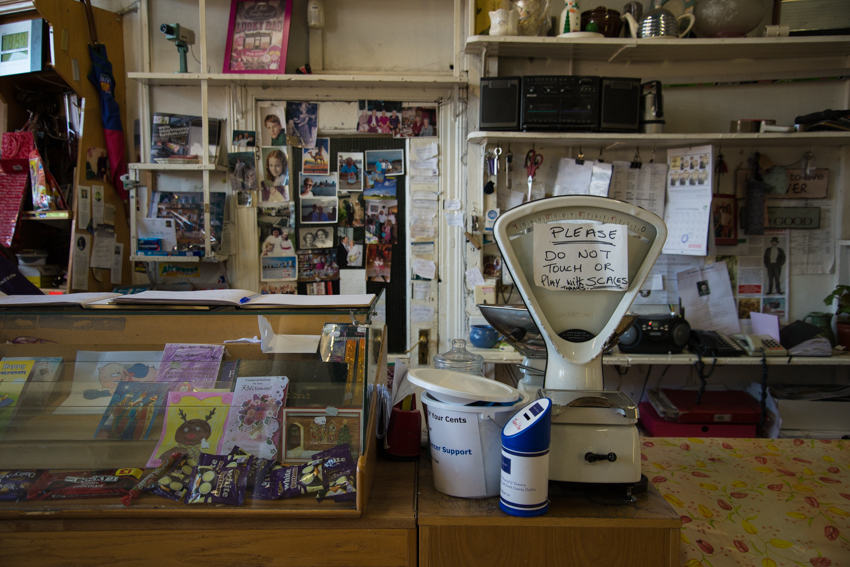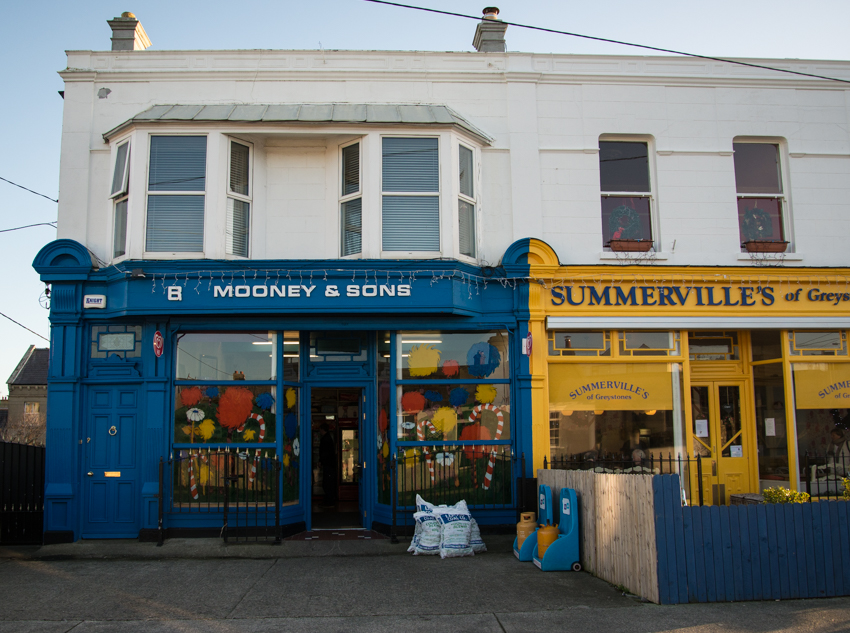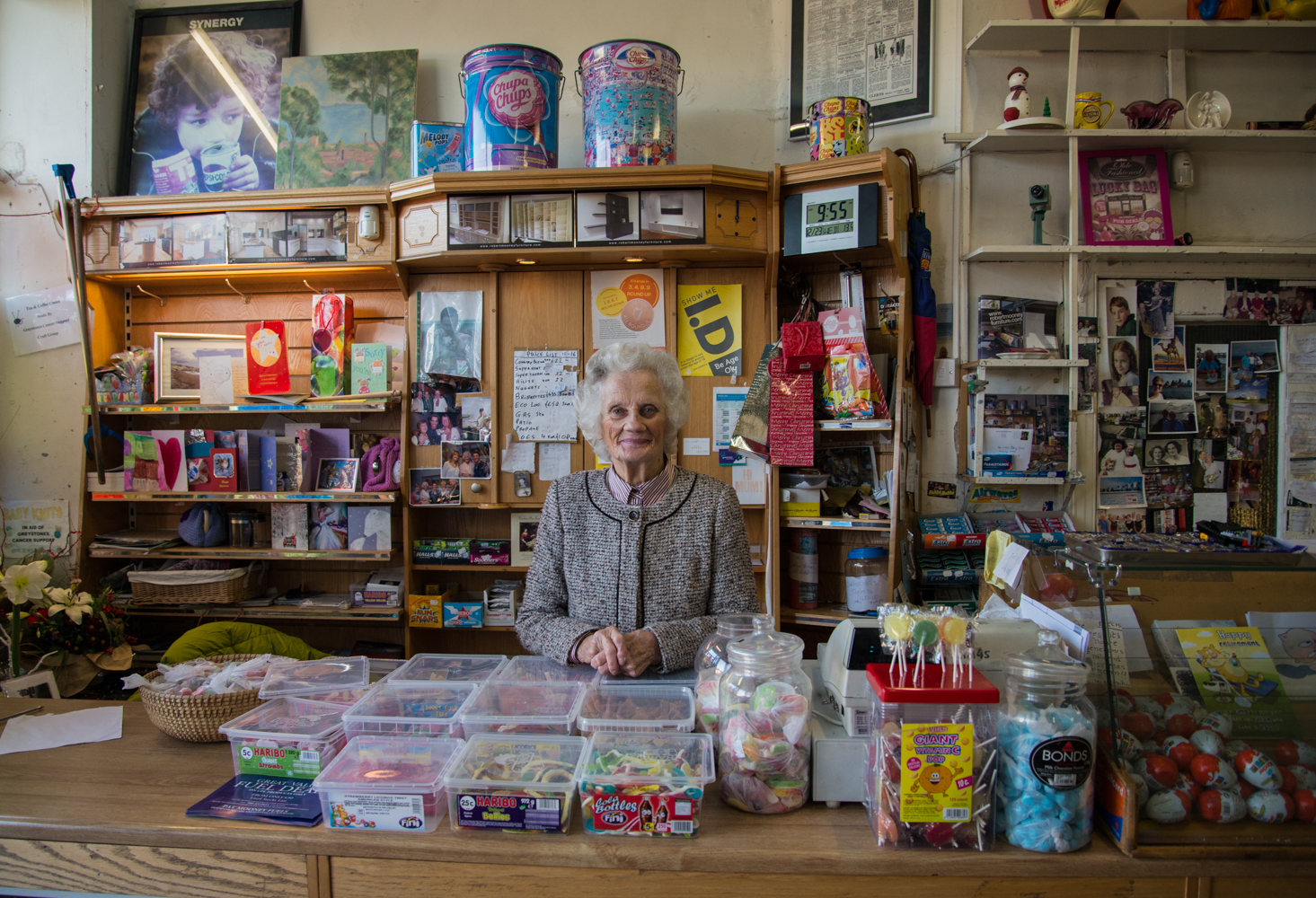Bridie Mooney sits behind a short desk partly covered by the newspapers and scraps of envelope on which she’s been doing her calculations. The plastic lid of a sweet box is filled with loose change, another with loose sweets. In front of her a young father stands with his two sons, come to say goodbye to the woman whose life and shop had become synonymous with the town of Greystones, Co Wicklow.
Mooney and Sons was the last old-fashioned newsagents in Greystones, and the shop’s announcement on Facebook that it was to close on Christmas eve was met with a mixture of outrage and disbelief that reverberated through the town. Since the announcement, Mooney has been swamped by “best wishes” both online and in person, something that the 86-year-old seems to find amusing: “Did you ever hear the like? Oh, God almighty.”
In a Facebook post that saw thousands of reactions, Mooney had posted: “It is with great sadness that I have decided to close my beloved shop. I am going to retire in my fine old age and take some time to myself. I have enjoyed all your company for so many years. A lot of hard thought has gone into my decision and it is with a heavy heart that this decision has been made.”
“I want to thank all my loyal customers young, old, past, present for all your kind words and business throughout the years. I will remember you all with great fondness and the joy you bring to me daily will never be forgotten.”
The comments that followed showed locals offer up anecdotes of their own relationship with Mooney, and the experiences of themselves, their children, their grandchildren. Locals refer to Mooney as “the First Lady to Greystones”, they state that “Greystones won’t be the same” without her, and that she will “never be forgotten”. Everyone promises to come, to share these sentiments with her in person.
Two days before the shop is due to close, the space slowly fills with those waiting for Mooney to return from her lunch in her flat above the shop. A mother tells her sons to hush as she signs a memory book that lies propped open on top of an old ice cream freezer covered in yellow wrapping paper. There are two books on the go, and both are nearly full. One of Mooney’s daughters, Áine, speaks to a customer on her mother’s behalf, an answer she’s given a hundred times already: “She’s delighted with her decision. She’s healthy, and that’s the main thing.”
We only ordered the old favourites. We just have the sweets that everybody loves
The shop’s walls are lined with stained white shelves on which bleach, clothes pegs, coffee and cooking oil are haphazardly placed. Much of the shelves are blank, but this is the norm rather than a consequence of packing up the shop. The shelves almost seem like they’re there for show for those who come in search of sugar – few people come here specifically to buy the fire logs, the toilet paper or the lighter fluid that they offer from behind the door, behind the torn leather armchair that rests in the middle of the shop. The real draw of the shop has always been the sweets, the large jars filled with the traditional favorites that are sold for twice the price elsewhere else – a nostalgia tax. Lemon Sherbets, Apple Sours, Bulls Eyes and Satin Pillows are squeezed into glass jars, “the glass ones are better. People are looking to buy them from me”.
On the higher shelves, under bleached signs for her son’s furniture company, rest small objects that have, inexplicably, been there for as long as most customers can remember – a small snowman, a plastic Dracula head, a metal teapot, a red racecar. She leans forward to divulge a secret: “After the article that was in the Irish Times, a man came in and paid €100 for the painting of the duck.”
The shop is as busy as I remember it from my own childhood, when myself and my classmates from the nearby school would pour in with €2 after school on a Friday. It’s business as usual, and demand is high. Áine turns to her 11-year-old son, Tadhg, to chastise him: “I want those two jars filled. You can’t come into your granny’s shop and just eat all the sweets.” Áine smiles apologetically to one customer: “The newspapers were cancelled for today. They never get it right.”
Stock, however, is starting to run low. The shelves usually reserved for chocolate bars has been taken over by thank you and good luck cards, with only a pile of Kinder Eggs and Wine Gums left in the bottom corner. Only crumpled packets of Tayto remain below the counter. “We only ordered the old favourites. We just have the sweets that everybody loves” Áine informs the adults, those who did not come for sweets, and hands a free chocolate coin to everyone waiting: “They’re not to be charged, everybody gets one.”

Parents seem happy that their children are being indecisive, taking advantage of the extra to try and forge a unique connection with the family – “Ah, sure, she’ll be missed for sure”. “Well, they can just go up the street”, Áine reminds people of the branch of the chain store “Auntie Nellie’s Sweet Shop” that has opened on the main street. One man won’t play along with the joke “Ah, well, it won’t be the same”.
Mooney arrives through the door behind the counter, a door covered in family photos faded by the sun and by time. Áine makes introductions, telling her how she supposedly knows these people. “I always get the names of everybody mixed up” she shrugs, half-abashed. “I’m still here, for another while anyway.” She turns to me and shrugs gently. It’s been like this for days: “There’s only so many things you can say.”
A stocky, middle-aged man with a dark beard and leather jacket walks through the door, and Bridie’s eyes light up instantly. “This is the bus driver”, she exclaims, a man who always stopped in on his route. He asks me to take their photo, before turning to her – “I’ll miss you.” “Well, you can always stop by. Wave outside my window, and I’ll come down.”
To talk to Mooney properly, I’m asked to come back the next morning, when her other daughter, Agnes, is on duty. As I enter, Agnes is reassuring an elderly woman looking to speak to her mother: “She’s just upstairs getting organised. She’ll be back in a minute. But wait if you’d like to”. The woman has come from the Aran Islands, and she connects with Agnes as they both know the same person. A reporter from the Herald walks in, and is told to come back when Mooney will have returned from mass. “Go next door for coffee”, he’s told, “Sure, you’ll have a lovely cup of coffee in there.” Agnes rolls her eyes, “She’s fed up doing interviews. The Wicklow Voice are coming, they’ve already done about ten interviews”. But, as the woman interjects, “it’s nice to see”.
Mooney may be sick of interviews but, with the entrance of a photographer, she situates herself behind the desk and applies a fresh coat of fuchsia lipstick with a wink: “It’s my colour.”
The shop is to close the next day, Christmas Eve, and Mooney has gotten her purple jacket dry-cleaned for the occasion. She interrupts me to ask me to help her take off the pin, the little green tag nestling between her jacket sleeve and forearm. “I just got it cleaned” she says proudly, “we’re having a glass of wine here between one and three. Well, a glass of something. A glass of Prosecco”. How does she want to celebrate herself? “Oh, well I’ll go to mass and that’s it. I’ll close, and that’s it.”
There was a queue from there to the end of the school yesterday for kids to come in for their sweets. They had the last of their few sweets – God bless them
It’s not clear if the town will let her do this, however. She lets out a small laugh, one that can only be described as a titter, when I mention how the community will miss her, and how they’re reacting. She lowers her voice into a whisper: “I drink Jameson, and I’ve been given at least 12 bottles of Jameson. People will say ‘Sure, that women’s a drunk’, but I only have a glass of Jameson. I wouldn’t drink more. How did everybody find out I drink Jameson?”
Mooney seems somewhat dismissive of the respect with which she’s held throughout the community, choosing instead to focus on smaller, more tangible measures of success. Like a small child she gleefully rubs her hands together and exclaims: “Well, Auntie Nellies was no worry to me at all, because I still sold all me sweets.” With a low whisper in my ear she continues: “Well, mine were always better, and I’ve never said that before.” Do the children still come in? Mooney gives a wry, knowing smile and jabs towards the centre of the shop: “There was a queue from there to the end of the school yesterday for kids to come in for their sweets. They had the last of their few sweets – God bless them.”
These are the kinds of changes she’s flags in the community – not the rapid expansion of the population, the influx of chain stores or the growth of the town from seaside village to commuter hub. Instead, she focuses on the small things, that which have affected her directly: “Since Lidl and Aldi came, we’ve had to change. We were selling a lot of vegetables, and we’re selling nothing now.”
To the edge of the counter has always say a large white scale with a taped-on, hand-scrawled sign: “Please, do not touch or play with scales. Thanks.” Does she still use them? Mooney seems almost insulted: “That’s a very good scales. You wouldn’t get anything like it now.”
Mooney has been in the shop for 62 years, having bought the property from the convent in 1957. Born on a farm in Carlow, her husband bought a shop across the street when they married in 1954, “then we bought here from the convent, we started here and that’s it”. The shop is between the local church and the convent, which was recently sold. Mooney remains proud of where she lives: “I’ve five bedrooms upstairs and a garden down the back and a sitting room down here. Sure I’m all right.”

The decline of power of a religious order is just one symptom of the steady tide modernisation engulfing the town. These days, the town is better known for its gourmet restaurants and luxury boutiques than for any of its history. Day-trippers are encouraged to come here to visit nationally-renowned organic café The Happy Pear, the symbol of either the town’s charm or pretentiousness, depending on who you talk to. The town’s biggest achievement in recent years is successfully campaigning to prevent McDonalds from opening beside a school, with children themselves drawing their own signs stating, “I am not lovin it”.
It’s perhaps hypocritical, but no one seems to object to Mooney’s own location. As to the biggest change she’s seen? “When I first came here, I was the only one on the Trafalgar Road wheeling a pram!”
Mooney is happier than anyone who enters the shop. “I’m feeling good, no aches or pains, except for a frozen shoulder. Sure other than that I’m good.” She stresses and raises her tone for every “good”, conveying surprise at her good fortune. A mark of her generation, perhaps, she’s not afraid to address the morbidity of life: “I’m still going – and I was a twin! My twin died at the birth of my baby, but she had a brain tumour – and I was only three and a half pound and she was seven. Three and a half pound and I was never sick in my life! We were reared just on ordinary food. But anyway, that’s life.”
That’s all I want now, good health and to see everybody. I’ll be able to go away now with the family, one of us has always had to be here
“I’m sorry to have to close up, because its my age. It’s all age related”, Mooney states, unprompted, but there’s really no evidence to suggest Mooney will regret her decision. “That’s all I want now, good health and to see everybody. I’ll be able to go away now with the family, one of us has always had to be here.”
As for the future of the shop? It seems the shop will end with her, “The girls don’t want it.” Agnes breaks off a conversation with a customer to glare at her mother: It’s not that, but it’s a seven day a week job. No one wants that”. It’s perhaps the best end for a shop that everyone insisted on calling Mrs Mooney’s anyway.
Mooney leaves the shop to Agnes to walk to mass, her white hair reflecting in the sun as she disappointed customers waiting outside, forced to make plans to come back later. Agnes chuckles: “She just likes to get a little prayer in.”







